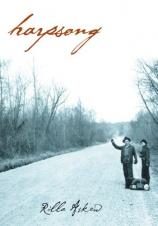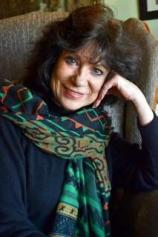Harpsong
About the Book
Harpsong
Harlan Singer, a gifted harmonica-playing troubadour, shows up in the Thompson family’s yard one morning. He steals their hearts with his music, and their daughter with his charm. Soon he and his fourteen-year-old bride, Sharon, are on the road, two more hobos of the Great Depression, hitchhiking and hopping freights in search of an old man and the settlement of Harlan’s long-standing debt.
The newlyweds don’t head west in classic Dust-Bowl-to-California migration but careen around the Great Plains in a giant figure eight, with Oklahoma in the middle, “the squeezed-in hourglass place.” The young couple’s personal hardships play out against the backdrop of communal hardships of the era, as they appear in hobo jungles and Hoovervilles, rabbit drives and dust storms, bank robberies, cow killings, and the siege of a county courthouse by out-of-work miners and their families in the coal-mining district.
Through much of the novel Harlan is searching for a wandering hobo and spiritual philosopher, an old man named Profit, who once saved Harlan’s life. Sharon longs to stop their ceaseless traveling, to return home to her family and settle down, but caught between the disruptive forces of the Great Depression and Harlan’s obsession --- and her own powerful love for her husband--she can only follow along. After Harlan's ruthless beating by a railroad bull, his quest changes, and Sharon comes to a moment of reckoning: will she continue to wander through the wilderness with her profoundly gifted and, in all practical ways, useless husband, or will she follow her own wants and needs, walk away and leave him so that she can live some semblance of a normal life? Sharon’s choice to go with her husband leads to the climactic scene in the Pittsburg County Courthouse that ultimately makes Harlan both a folk hero and a fugitive from the law with a price on his head.
Harpsong is told in three voices: folksay, the folktale-inflected, collective voice of the people of eastern Oklahoma; Sharon, who declares that no one knows the real story except “me here, Sharon, his wife;” and deepsong, the poetic, deep consciousness of Singer himself, whose source the reader understands only at the story’s end. Employing an elliptical narrative structure that turns back on itself, reflecting the paths of the young travelers as they roam the country in an infinity-sign figure eight, Harpsong explores themes of love and loss, sin and redemption, hope and hopelessness, what human beings ultimately owe one another, and the wayfaring orphan’s search for home.
Harpsong
- Publication Date: May 15, 2007
- Hardcover: 256 pages
- Publisher: University of Oklahoma Press
- ISBN-10: 0806138238
- ISBN-13: 9780806138237










